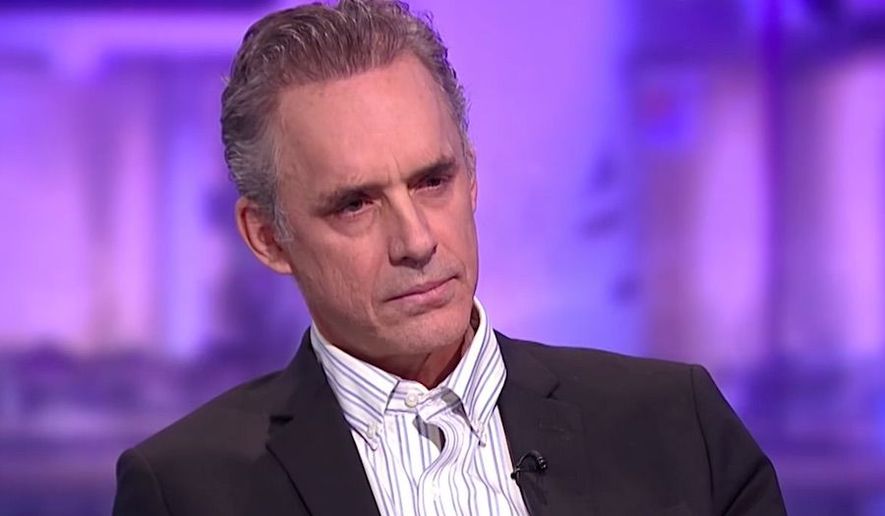Canada
The Peterson Principle: Intellectual Complexity and Journalistic Incompetence
In contrast were the flawed reporting and misinformed commentary that characterized respected mainstream media reports.

It was while I was watching Channel 4 news presenter Cathy Newman’s spectacularly disastrous interview with University of Toronto professor Jordan Peterson that what was wrong with much of journalism today crystallized in my brain.
I’d been oscillating between anger and frustration watching Canadian media fail again and again – and often in jaw-dropping fashion – in reporting on Peterson and I couldn’t quite establish what was going wrong.
Peterson is the teacher and clinical psychologist who burst onto the scene after making a video decrying the government’s Bill C-16 which compelled the use of invented gender pronouns (ze and zir, etc) for non-binary and transgender people. Peterson connected the “compelled speech” of the legislation (and the unscientific instantiation of gender as a non-biologically-correlated social construct) to radical leftist ideology and authoritarian governments.
In an admittedly complex and controversial argument, Peterson blamed the spread of postmodernism within the academy for the rise of both identity politics and the emergence of the illiberal left. Many of the stories about him were shallow or missed the point, but several in respected publications like the Globe and Mail and Maclean’s by Tabatha Southey, Ira Wells and most recently by John Semley, were just hatchet jobs, replete with insults, inaccuracies and what appeared to be deliberate misrepresentations. In short, bad journalism you would not expect in good outlets.

At the same time, and on what I thought was a completely different channel, I was enjoying a new discovery – the podcasts of neuroscientist and public intellectual Sam Harris. I was finding these long, complex conversations between highly intelligent people mesmerizing. I listened to Harris talk with evolutionary biologist Bret Weinstein, MIT professor and A-I expert Max Tegmark, New York Times writers Mark Lilla and David Brooks, and many others. Often, I would listen to them twice because of the depth and sophistication of the discussions. This led me to the Rubin Report podcast, where interviewer-comedian Dave Rubin would do one-on-one interviews with people such as Peterson himself, British author and social critic Douglas Murray, Concordia University professor Gad Saad, and many others. What I was getting was precisely what was missing from virtually all the media coverage of the Peterson issue: intelligent inquiry, honest discussion, the exchange of views and the critique of ideas that is possible when really smart people talk about really difficult topics. In contrast were the flawed reporting and misinformed commentary that characterized respected mainstream media reports.
When I first heard about the Peterson affair, I did what I was trained to do: I spent hours researching – reviewing the original videos, listening to many hours of online lectures, and carefully analyzing the claims and counterclaims. That revealed, in startling fashion, just how shallow and facile much of the media reporting was. Then I imagined what doctors, engineers, physicists, psychologists, lawyers and any informed person thinks of the quality of the stories that touch upon their area of expertise. No wonder people are jaded about journalism today. So much of it is lazy,– and just wrong – so much of the time.
Take Ira Wells’ piece, titled “The Professor of Piffle” in the Walrus. Here, the U. of Toronto lecturer and freelance writer made statements that any informed reader could immediately recognize as false and seemingly dishonest. He writes, “It seems indisputable: Peterson is now the most famous professor in Canada. What he is not, however, is the author of any lasting work of scholarship, the originator of any important idea, or a public intellectual of any scientific credibility or moral seriousness.”
It’s admittedly hard to predict what might be lasting or important, but Peterson taught at Harvard for five years, is the author of the serious book Maps of Meaning (1999) and has published more than 100 peer-reviewed scientific journal papers. He has almost 6,000 citations and is the recipient of multiple research grants. Claiming he has no “scientific credibility” is not an opinion, it’s a verifiable falsehood.
Wells continues, “In a conversation with Camille Paglia, he lamented that men can’t exert control over “crazy women” by physically beating them … Few in the media who have lauded Peterson as being “right” on free speech in universities have bothered to qualify that he is dangerously wrong about everything else …”
The Paglia quote is an outright misrepresentation and there are many more in the article. For a full enumeration of them, see Uri Harris’ thoughtful essay “In Defense of Jordan B. Peterson” in which he states that: “Wells’ essay is littered with inaccuracies and casual insults, accompanied by a moralistic undertone” and then systemically exposes each of Wells misstatements. It’s hard not to conclude that Wells is being purposely dishonest in what he wrote about Peterson.
Next up is former Globe and Mail columnist and now Maclean’s pundit Tabatha Southey’s piece “Is Jordan Peterson the stupid man’s smart person?”
Tabatha Southey on what makes Jordan Peterson's work so unnerving https://t.co/sZLiG19wvV
— Maclean’s Magazine (@macleans) January 29, 2018
It is a string of ad hominem attacks interspersed with jibes designed, apparently, for humour. Devoid of any engagement with ideas, the piece does not even remotely adhere to the precepts of real journalism. Reader response was fierce and the more than 200 comments captured the frustration so many seem to feel about media today:
It’s really sad. Southey could have given an honest critique of Peterson and his ideas without resorting to dishonesty, especially dishonesty that’s so easy to see through. This is unfortunately very poor journalism.
This article is so poorly written I had to read some sentences twice, in spite of the fact that they contained no information. It is just a boilerplate of logical fallacies: ad hominem attacks, straw man arguments, appeal to ridicule, appeal to emotions … To answer the author’s question, I think Jordan Peterson is the stupid person’s smart nemesis.
Most intellectually lazy piece of writing I’ve seen in a while. Basically name calling because the author does not like what Dr. Peterson says, not a single serious discussion of any ideas… If you’re going to disagree with someone, at least think about it for more than a few seconds, and then maybe, maybe, you’ll be able to formulate some sort of logically coherent response.
The Globe and Mail’s full-page story on Peterson by Simona Chiose – “Jordan Peterson and the trolls of the ivory tower” didn’t address Peterson’s claims or the concerns he has articulated. Rather, it focussed on the extremists he sometimes attracts online and on the money he is making. It’s difficult to read the piece and not come away with the view that Peterson is at best irresponsible and at worst, a craven opportunist. Yet anyone who has listened to any of his 500 hours of free online lectures understands that labeling him as an “alt-right” sympathizer is ludicrous.
John Semley’s piece, again in the Globe and Mail, is even worse. Marked “Opinion” Semley’s article is a mean-minded string of insults and personal attacks. He calls Peterson “an absurd figure,” “a wholly unimposing specimen,” “an intellectual snake oil salesman,” “a shameless huckster,” and “a prophet for profit.” No doubt, Semley thinks this passes for wit, but it’s just reckless, dishonest showing off. People who practice real journalism adhere to the rule that in an op-ed, the opinion must be one that could be held by an honest person in possession of the facts. It’s perfectly reasonable to disagree – even violently – with Peterson’s ideas, but no honest person could survey his 30-year career teaching and researching and surmise that he is a money-grubbing charlatan.
Of course, some articles were better than others. Christie Blatchford’s reporting was factual and careful and her commentary measured as was the New York Times David Brooks’ column. Better pieces appeared off the mainstream media grid such as Tom Bartlett’s nuanced piece for the Chronicle of Higher Education. But overall, major media repeatedly missed the mark, lazily reinforcing false stereotypes and parroting unsubstantiated accusations.
This reached its nadir when Cathy Newman had Peterson on Britain’s Channel 4. In this train wreck of an interview which went viral, you can see everything that is wrong with mainstream media today.
What transpired is neither a conversation nor an interview. Newman made no effort to illuminate or understand Peterson’s views. Peterson himself, speaking about the interview later, said: “She was arguing against who she thought I was … I realized almost immediately that whoever she was talking to bore little resemblance to me.”
It’s difficult to document every misstatement that Newman made in the 30-minute interview. She failed spectacularly and the result is amusing in a way, but also deeply unsatisfying. Why? Because journalists are not supposed to be in the business of buttressing ideologies; they’re supposed to be truth seekers. But in much of what has been written and broadcast around this subject, truth has been nowhere in sight. Watch CBC’s Wendy Mesley’s interview with Peterson for more of the same.
Though less overtly confrontational than Newman, Mesley makes no honest attempt to elucidate Peterson’s actual views. The interview is instead constructed around a “gotcha moment” where Mesley pulls out a photograph of Peterson posing with two young men and a Pepe the Frog banner. “It’s seen as an alt-right symbol, and here you are holding up a flag like it’s a joke,” she says. “I’m wondering why you would choose to be in this photo?”
Unperturbed, Peterson calmly responds that he has posed for thousands of pictures and that he’s done a two-hour lecture expressing his thoughts on the meaning of the Pepe the Frog symbol. Mesley ignores this. Neither the photo nor her question has any real bearing on what Peterson lectures on or writes about. It does nothing to interrogate what he’s saying and why so many people in the English-speaking world are listening. It’s false, and it rings false.
The only moment of real exchange is at the end, where Wesley seems truly caught off guard by Peterson’s answer to her banal question: “What’s next for you?”
“I don’t know what’s next really… The overwhelming likelihood, as far as I’m concerned and it’s been this way since September of 2016, is that this will go terribly wrong.…I think it’s unlikely that it will continue in a positive direction but you never know,” he says, pausing. “It’s too much, eh? It’s been too much for a long time. But so far so good and I’ll ride it out as long as I can. I’m surfing a hundred-foot wave and generally what happens if you do that is you drown.”
“That’s interesting,” replies Mesley.
Yes, it is. And it’s disarmingly honest and compelling. And a whole interview conducted in that spirit of open exchange would have been fascinating.
Why don’t we get these nuanced conversations? Journalists are not stupid. Some of the smartest people I have ever met have been in newsrooms. So, what’s the problem?
Some are the same issues that have plagued mainstream media for decades: lack of time, lack of specific expertise, the decline of informed beat reporters and an unhealthy tendency toward the sensational and the spectacular. But there’s something new afoot, something more insidious.
Today’s mainstream reporting on difficult subjects is often bereft of most of the qualities that define journalism itself. Instead, it demonstrates a lack of respect for evidence; a penchant for conflict; a desire not to understand but to confront and perhaps most dangerously, a lack of nuance. Instead of inquiry and critique, we get knee-jerk adherence to whatever the current dogma happens to be. On topic after topic that folks like Sam Harris and Peterson meet head on with facts and studies, mainstream media falls in lock step with the zeitgeist of the day: gender is divorced from biology, any critique of Islam is bigotry, cultural appropriation is abhorrent, words are actual violence. And worse, when writers or editors dare to challenge these “truths”, or deign to suggest a real conversation is in order, they are banished, fired or called racists. On the other hand, authors who pander to the flavour-of- the-month outrage are given national platforms that their shallow, mean-spirited writings don’t deserve.
But is that what people really want? Increasingly, I’m convinced that mainstream media is on the wrong track and the only way to ensure its future is to change course, drastically. Right now.
The danger that people will abandon bad mainstream journalism is real and present. Kevin O’Rourke captures this fear in his piece, “The Curious Case of the Canadian Psychologist” when he says of the Cathy Newman interview: “This whole episode could turn out to be a watershed moment in the history of Britain’s relationship with the news. Why watch Cathy Newman act the clown in an expensive studio when you can get Sam Harris vs Jordan Peterson on your phone? If you have something to say to the public, why let journalists filter it when you can talk to a camera and put it on YouTube?”
While mainstream media emphasizes quick hits, short interviews, and click-bait headlines, a significant proportion of the public is seeking something else. My intuitions are, of course, anecdotal, but the hunger for honest reporting and informed discussion is quantifiable. Peterson’s channel has more than 800,000 subscribers, his long lecture videos have received almost 40 million views, averaging about 4 million a month. The Rubin Report has 635,000 subscribers and has received a total of 140 million views at nearly four million a month. Sam Harris’s podcasts receive about 2 million visits per month.
While mainstream media struggles with declining readership and a public that refuses to financially support what they are delivering, online audiences are lining up and paying. And that audience is huge and growing steadily. A 2017 Edison Research Study reported that 24 percent of Americans (67 million people) are monthly podcast listeners, up 40% in two years.
The average listener subscribes to six podcasts and 85% report listening to the entire show or most of it. That’s tremendous breadth, depth, and growth – and it’s still early days. Thinking people want – and need – informed discussion about complex, thorny issues that is intellectually rigorous and fact-based.
Mainstream journalists need to engage in critical thinking, to once again speak empirical truth to dogma, to defend facts and evidence and to fearlessly question groupthink and intellectual tyranny of all kinds. They need to respect smart citizens by being smart themselves and engaging in honest reporting and commentary.
Because I fear that if they don’t, others will. And journalists and journalism as we know it will become irrelevant.






